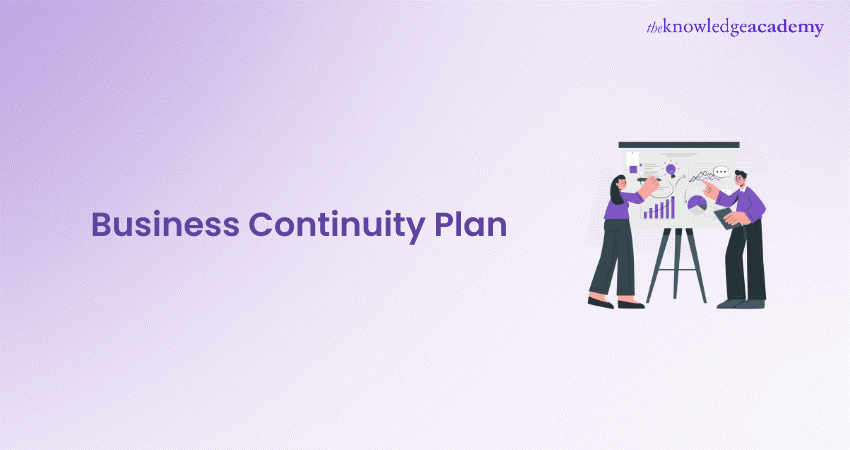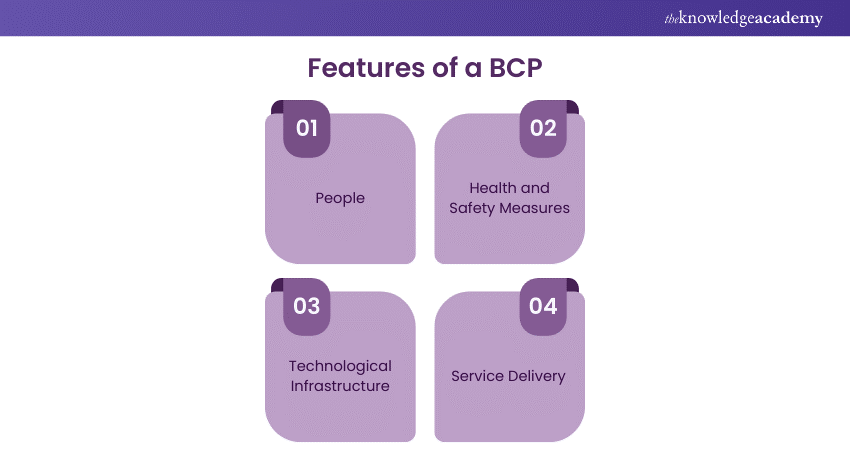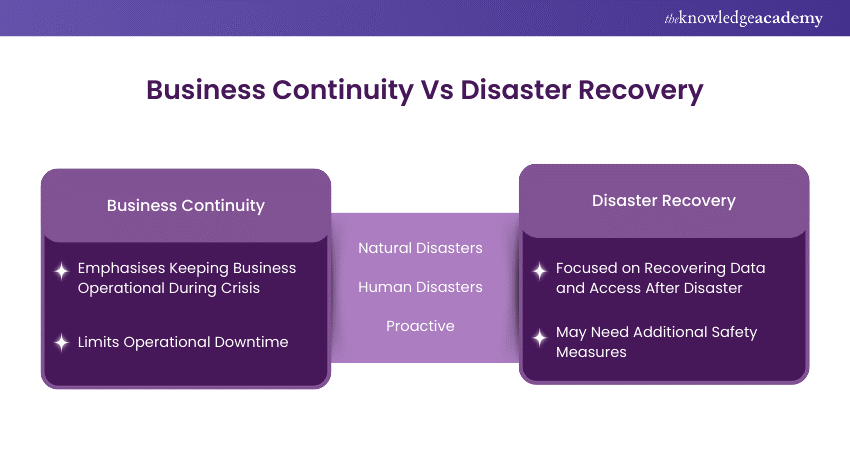We may not have the course you’re looking for. If you enquire or give us a call on 01344203999 and speak to our training experts, we may still be able to help with your training requirements.
Training Outcomes Within Your Budget!
We ensure quality, budget-alignment, and timely delivery by our expert instructors.

Challenges and Crisis - This is the stern, inevitable duo that torments the corporate world. While small day-to-day challenges can be dealt with in a short amount of time, a big crisis descends without a warning and inflicts deeper wounds to businesses. The only defence against such scenarios is proactive preparedness, and nothing streamlines preparedness in the world of business quite like a Business Continuity Plan (BCP).
BCP is essentially your steadfast compass guiding your organisation through the turbulent sea of unexpected disruptions. This blog explores the key components, benefits, and steps to creating an effective Business Continuity Plan. So read on and fortify your business for any eventuality.
Table of Contents
1) What is a Business Continuity Plan (BCP)?
2) Importance of Business Continuity Plan (BCP)
3) Features of a Business Continuity Plan
4) Elements of a Business Continuity Plan
5) How to Create a Business Continuity Plan (BCP)?
6) Advantages of a Business Continuity Plan (BCP)
7) Difference Between Business Continuity and Disaster Recovery
8) Business Continuity Plan Template
9) Conclusion
What is a Business Continuity Plan (BCP)?
A Business Continuity Plan (BCP) provides guidelines and procedures that your company can follow during and after a crisis. These plans encompass business processes, key assets and partners, human resource roles, and other critical information to sustain your brand's relationships with stakeholders.
The aim is to address anything from minor disruptions to major threats such as fire, earthquake, flood or Cyberattacks. Preparing contingencies in advance for such scenarios can help your business remain operational during sudden or unavoidable disasters.
Importance of Business Continuity Plan (BCP)
Risks can be managed but complete elimination is impossible. This makes Business Continuity Planning (BCP) vital because, without it, an organisation faces downtime and various other issues that could harm its financial health.
Especially in case of major disasters, the absence of a Business Continuity Plan (BCP) could lead to permanent closure to the business due to irreversible financial damage. By considering the essential functions necessary for your business to operate, you can start to identify specific risks and plan for them within those functions.
Features of a Business Continuity Plan
While certain features of a Business Continuity Plan (BCP) will be specific to a business or industry, several components are common to almost any plan:

1) People
A BCP will define clear roles and responsibilities. These roles and responsibilities are not only for the crisis management leadership team but for any units responsible for implementing diverse aspects of the overarching plan.
Some BCPs will also identify ‘essential personnel’, whose roles require them to report to work even during periods of elevated risk.
2) Health and Safety Measures
A robust Business Continuity Plan (BCP) will include criteria and guidelines that ensure the safety and health of everyone involved in the implementation and management of the plan. This includes employees, customers and partners.
3) Technological Infrastructure
Most modern BCPs will outline the role of Information Technology (IT) in ensuring that critical data, applications, and services remain available or are quickly restored after a disruption. This includes:
a) Data backup and recovery tools
b) Cloud computing infrastructure and services
c) Remote work platforms
4) Service Delivery
Additionally, a BCP should detail which services are most critical and how they will continue to be delivered to employees, customers, partners, the public, and other stakeholders.
Elements of a Business Continuity Plan
While the execution process of a Business Continuity Plan (BCP) may vary based on the nature of the crisis or industry, an ideal BCP should contain the following basic items:
a) Initial data at the beginning of the plan, including important contact information.
b) Revision management process that details change management procedures.
c) Purpose and scope of the plan.
d) Procedures on using the plan, including guidelines as to when the plan will be initiated.
e) Policy information.
f) Emergency response and management procedures.
g) Step-by-step procedures along with checklists and flow diagrams.
h) Glossary of terms used in the plan.
i) Schedule for testing, reviewing and updating the plan.
Enhance your career opportunities with this Business Continuity Training!
How to Create a Business Continuity Plan (BCP)?
With the key elements of a Business Continuity Plan (BCP) in mind, it’s time to create a robust BCP. To achieve that, companies must follow the following steps:
a) Business Impact Analysis (BIA): in this step, the business will identify time-sensitive functions and the resources required for them. Usually, this phase entails prioritising different areas or departments in terms of how important they are to the operation. This confirms that your plan ultimately ensures the continuity of the most critical functions first.
b) Recovery: In this portion, the organisation will determine and implement steps to restore vital business functions after the crisis.
c) Organisation: This step necessitates the formation of a continuity team which will be responsible for managing disruptions and creating a response plan.
d) Training: Even the most comprehensive BCP requires regular testing to ensure its effectiveness. This involves training employees about their roles and responsibilities during such scenarios and conducting trials of different plan components. For example, a short-term implementation of a remote work scenario can help identify issues and opportunities for improvement
Additionally, companies may benefit from creating a checklist which includes:
a) Emergency contact information
b) Necessary resources for the continuity team
c) Locations of backup data
d) Miscellaneous essential personnel.
Besides testing the continuity team, it’s also important to test the BCP itself multiple times to ensure it can handle diverse risk scenarios. This helps identify and eliminate any weaknesses in the plan.
Looking to strengthen your business’ defences? Our ISO 22301 Certified Business Continuity Management is here to help. Register now!
Advantages of a Business Continuity Plan (BCP)
With increasing frequency of natural disasters and data breaches, it’s not a matter of if, but when a disruptive event will take place. Business Continuity Plans (BCP) can help organisations address several key issues before disruptions happen:
1) Unprepared Employees: By proactively creating plans and training employees, organisations ensure a safe and timely recovery. Identifying sensitive and critical functions in advance enables prompt execution of the plan during a crisis.
2) Insurance Limitations: While insurance plans (Healthcare, vehicles, or equipment replacement) are fine, it can’t compensate for the loss of customers who might turn to competitors following damage to the company’s reputation.
3) Investment in Continuity: Although developing a BCP involves fixed costs for training, wages, and equipment, it ensures that the company can resume operations quickly in the event of a disaster.
Here’s how BCP can help different departments:
|
Functional Area |
How BCP Helps |
|
Customer Service |
Ensure adherence to service level agreements (SLAs) even during disruptive events. A good plan enhances reputation with B2C customers, which is crucial for health, food and medical products. |
|
Marketing |
Preplanning and utilising the right marketing channels enable the business to quickly reassure customers and stakeholders, despite the disruption. |
|
Finance |
Fostering a culture of integrated planning and rolling forecasts provides a real-time view of the company's situation, enabling quick adaptation to changes. |
|
Operations |
Provide local emergency services with facility information and accurate floor plans to speed up rescues. |
|
Human Resources |
Listing the assets that have been assigned to each employee makes it easier to understand everyone’s capacity, once they work remotely. |
Aiming for a lead role in Business Continuity Management? Sign up for our ISO 22301 Lead Implementer Course now!
Difference Between Business Continuity and Disaster Recovery

The difference Business Continuity Plans and between Disaster Recovery Plans is that Disaster Recovery Plans are technical and primarily focus on recovering from failures. On the other hand, Business Continuity Plans manage relationships and operations during a crisis. Disaster recovery plans are essentially subsets of an overarching Business Continuity Plan.
For example, in a larger crisis like a flooded building, a company might lose some IT services. Consequently, one or more Disaster Recovery instructions focused on restoring those IT services would be part of the broader Business Continuity Plan.
Business Continuity Plan Template
Once you have formulated the way to create a Business Continuity Plan, consider this as your ideal BCP template:
|
Name of Organisation Date: 1) Program Administration a) [Purpose of the plan] b) [Objectives of the plan] c) [Budget] d) [Timeline] 2) Governance a) [Members of the business continuity team with their roles and contact information] b) [Other stakeholders with their contact information] 3) Business Impact Analysis 4) Strategies and Requirements a) [Proactive strategies to prevent crises] b) [Reactive strategies to immediately respond to crises] c) [Reactive strategies for long-term recovery from the crises] 5) Training and Testing a) [Training schedule for employees] b) [Testing schedule] |
Conclusion
A Business Continuity Plan (BCP) is not just about survival; it's about a company thriving amidst adversity. We hope this blog helps you embrace the power of foresight as you navigate your organisation through a meticulously crafted Business Continuity Plan.
Prepare your business for any crisis event with our Certified Business Continuity Management Professional (CBCMP) Course – Sign up now!
Frequently Asked Questions

A Business Continuity Plan (BCP) is used for preventing and recovering business systems from potential threats, such as natural disasters or cyber-attacks.

A Business Continuity Plan (BCP) checklist is a document that comprehensively outlines the steps required to make sure the continuity of business operations during unexpected crisis situations.

The Knowledge Academy takes global learning to new heights, offering over 30,000 online courses across 490+ locations in 220 countries. This expansive reach ensures accessibility and convenience for learners worldwide.
Alongside our diverse Online Course Catalogue, encompassing 17 major categories, we go the extra mile by providing a plethora of free educational Online Resources like News updates, Blogs, videos, webinars, and interview questions. Tailoring learning experiences further, professionals can maximise value with customisable Course Bundles of TKA.

The Knowledge Academy’s Knowledge Pass, a prepaid voucher, adds another layer of flexibility, allowing course bookings over a 12-month period. Join us on a journey where education knows no bounds.

The Knowledge Academy offers Business Continuity Training. These courses cater to different skill levels, providing comprehensive insights into Business Continuity Management.
Our Business Improvement Blogs cover a range of topics related to Business Continuity Plans, offering valuable resources, best practices, and industry insights. If you are looking to learn about Business Continuity Management, The Knowledge Academy's diverse courses and informative blogs have got you covered.
Upcoming Business Improvement Resources Batches & Dates
Date
 Certified Business Continuity Management Professional (CBCMP)
Certified Business Continuity Management Professional (CBCMP)
Thu 1st Jan 1970







 Top Rated Course
Top Rated Course



 If you wish to make any changes to your course, please
If you wish to make any changes to your course, please


